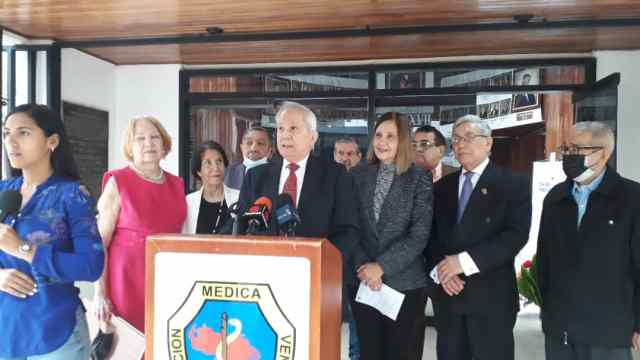
The health care workers’ situation in Venezuela is precarious and has a direct impact on the care these professionals provide to the population. According to the Venezuelan Medical Federation (FMV), at least 42,000 health workers have left the country in recent years due to the economic crisis, miserable salaries, and the lack of response to their socioeconomic demands.
By Dialogo Américas – Guillermo Saavedra
May 10, 2023
“The first problem is the salary, which in practice does not exist. The established minimum wage is a little less than $5 a month and pensions and retirements are nil,” Pablo Zambrano, executive secretary of Venezuela’s National Federation of Health Workers, told Diálogo on April 15. “This causes migration of health professionals to other countries to dedicate themselves to other types of work, or who go to the informal sector in Venezuela.”
FMV President Dr. Douglas León Natera said that the low salaries and the regime’s persecution of workers continue to cause mass resignation and migration of physicians of all specialties. In addition, he warned that the country’s hospitals are constantly failing to provide basic services such as water, electricity, and medical supplies, making it increasingly difficult to provide adequate medical care to patients.
Zambrano confirmed the situation FMV described, pointing out that health workers’ human rights are being seriously affected.
Jaime Lorenzo, physician and director of the organization Doctors United for Venezuela (Médicos Unidos por Venezuela), said that 70 percent of the nursing professionals and bioanalysts left the country or work in other non-health related fields, according to the NGO HUM Venezuela, which reports humanitarian emergencies in the country.
Lorenzo said that this problem extends to doctors and workers in the sector, adding that between 25 and 30 percent of the medical personnel work in private centers, where they have to spend some money out of pocket to practice, which is prohibitive for many doctors, especially the younger ones.
Although there are exceptions, the lack of supplies is another problem that seriously affects the country’s hospitals, especially in Caracas, as they do not receive the funds to purchase supplies and must make do with the regime’s centralized purchases, Zambrano said.
“There is revenue that comes in dollars such as from oil, diamond mining, aluminum, iron,” said Zambrano. “The regime then cannot say that it cannot invest $1 million to repair CT scanners, mammographs, MRIs, infrastructure, ambulances, buy light bulbs, in other words, what is needed for the operation of a hospital.”
According to Zambrano the harassment hospital workers are subjected to from authorities is also a major problem, as they are required to fulfill their labor obligations, even though many of them cannot afford transportation to get to work.
“In health centers it happens often when officials of the Maduro regime retaliate against the workers of these centers, such as by accusing them of being terrorists simply for asking for decent salaries, even to the point of taking these complaints to the prosecutor’s office,” Zambrano added.
The lack of protection and the abuse health professionals endure directly affects patients’ care.
“When a patient arrives, who shows their face? Many health centers do not have elevators, and they must carry patients up the stairs on stretchers,” Zambrano said. “All health centers in Venezuela had to lower their care and hospitalization capability, reaching up to 20 percent of the patients they were attending at their peak.”
The vaccines situation in Venezuela is also adverse and has even led to the reappearance of previously eradicated diseases.
“We are very far from meeting the international standard to be able to say that the population is adequately vaccinated,” Dr. Huníades Urbina, vice-president of the National Academy of Medicine of Venezuela, told Unión Radio 93.7FM. The doctor warned that diseases such as diphtheria have reappeared, due to the low incidence of immunization that predates the pandemic. Low immunization coverage for polio has also been recorded and, according to the Pan American Health Organization, Venezuela is in a high risk zone for the reappearance of this disease as well as measles.
The medical professionals have asked the regime repeatedly to implement a hospital recovery plan, Dr. Natera said, but they’ve had no response, only profound silence.
…
Read More: Dialogo Américas – Venezuelan Doctors Blame Maduro for Exodus of Health Professionals
…

